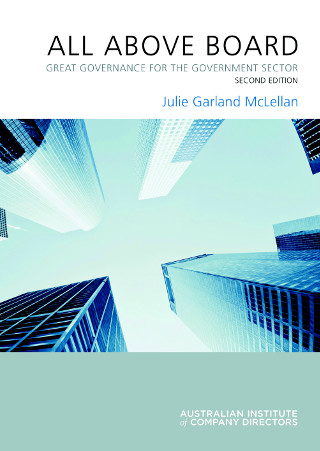Book review - All Above Board by Julie Garland McLellan

Government boards are complex and complicated workplaces. The organisations are often required to balance competing interests, model desirable traits such as transparency, inclusivity, and sustainability, while generating returns that are comparable to those of efficient private sector entities.
Add to that a political dimension, intense public scrutiny and awareness, a watchful press that needs stories, and a board of directors that is often drawn together by a process that is not run by the board itself, and you have a recipe for disaster. Yet most government-owned organisations do an admirable job and are well governed by highly motivated and professional boards.
This practical manual explains some of the key differences in roles and responsibilities between public and private sectors. It shares good practices and case studies that can be emulated by other boards and is an excellent reference for senior executives and directors in government entities.
Available in soft or paperback format through the Australian Institute of Company Directors.
What's New - In December and January
I enjoyed a frantic approach to the holidays with a new board seat that generated exciting - and gratifying - work. I also ran a governance update for a not for profit board in the medical sector, some leadership workshops and training for a government sector organisation that is currently under administration and will resume board leadership in the future, presented a workshop on how to approach a board portfolio for the alumni association of a prestigious university, launched an exciting international directorship program for IE Business School and AGSM, attended my usual board and committee meetings, kicked of a board performance review for a major government sector company, and enjoyed meeting a few Director’s Dilemma readers at the inevitable and enjoyable Christmas parties.
January has been similarly busy and I am looking forward to another great year.
I am always keen to work more and will be delighted to hear from you if you would like to arrange a board strategy workshop or board performance review!
Inspirational quote for February - This month my favourite quote is:

A note on names - A few readers have asked me where I find the names for the protagonists in each case study. I can only say that I 'borrow' them from people I meet or things that I read. William is an old Germanic name that encompasses the concepts of 'Will' or 'Desire' and also of 'Protection'. Our protagonist William is showing signs of being a protective leader by making sure he understand the rules and implications before following the lead of his fellow directors.
This newsletter - If you have any ideas for improving the newsletter please let me know. If you are reading a forwarded copy please visit my website and sign up for your own subscription.
Suggestions for dilemmas - Thank you to all the readers who have suggested dilemmas. I will answer them all eventually. I could not write this newsletter without your help and without the generous help of all the experts who respond each month to the case studies.
Be a contributor - if you would like to attempt a response to the dilemmas for publication you will be most welcome. Simply reply to this email and let me know.
Let's connect - I use LinkedIn to share information about boards and directorship with my friends and acquaintances. If you use LinkedIn and we are not yet connected I will welcome a connection from you. You can find me at linkedin.com/in/juliegarlandmclellan.
Let me help you - If you would like me to speak to or train your board, staff, audience and/or group please contact me at julie@mclellan.com.au.
Farewell until the next issue (due 1 March 2018). I look forward to greeting you again then. In the interim I hope you will enjoy health, happiness and hard work.
Enjoy governing your corporations; we are privileged to do what we do!
Best regards,
Julie
 William is a young director who is building a portfolio that includes two commercial boards and a not-for-profit. He applied to join the board of a government body and, after a thorough process, received a letter from the Minister informing him of his appointment. He is delighted.
William is a young director who is building a portfolio that includes two commercial boards and a not-for-profit. He applied to join the board of a government body and, after a thorough process, received a letter from the Minister informing him of his appointment. He is delighted.
 As directors are not employees of the company or, in this case, government body, they are not paid a salary; rather, they are paid a fee or emolument.
As directors are not employees of the company or, in this case, government body, they are not paid a salary; rather, they are paid a fee or emolument. William is right to check the administrative arrangements. Company directors rely on their excellent reputations; he must be scrupulously correct.
William is right to check the administrative arrangements. Company directors rely on their excellent reputations; he must be scrupulously correct. Helen's Answer
Helen's Answer


